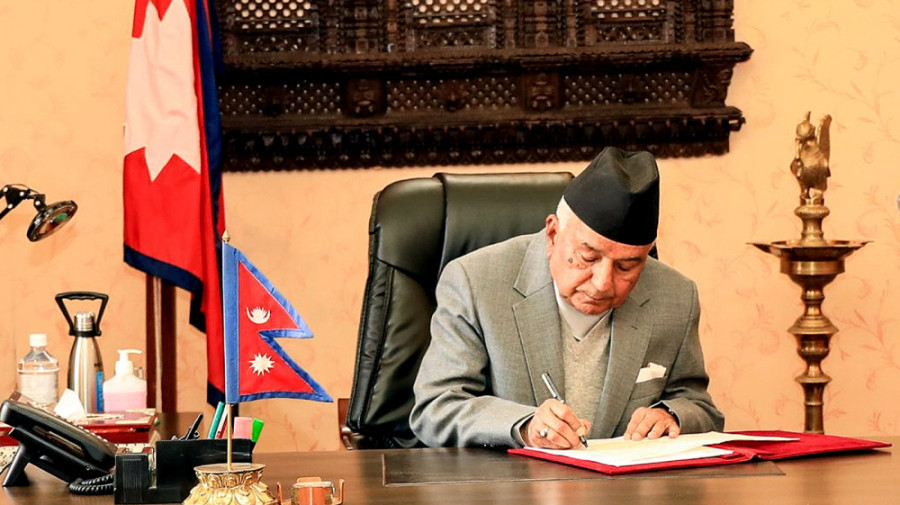Politics
President’s decision to send bill back to House triggers rift in ruling coalition
UML calls return of constitutional council bill an attack on parliamentary supremacy.
Binod Ghimire
The major ruling parties are divided over President Ramchandra Paudel’s decision to return the Constitutional Council (Functions, Duties, Powers and Procedures) Amendment Bill to the House of Representatives for reconsideration, arguing that it contradicts the spirit of the constitution.
While the Nepali Congress, senior coalition partner, has taken it as a natural move, the ruling CPN-UML says the President’s assessment that the bill does not align with the constitution is fallacious.
“The proposed amendment bill, prima facie, appears to be contrary to the spirit and essence of the constitution, as well as to universally accepted democratic practices and norms. I fear that such a practice may limit and constrict constitutionalism,” reads the President’s justification for returning the bill.
Paudel has stated that the amendment, which seeks to allow decisions to be made by a minority in the absence of a majority of members, attempts to undermine the constitutional and legal governance system.
“Recommendations and decisions in the Constitutional Council must be made through the consensus of the total number of members specified in the constitution. If consensus cannot be reached, under no circumstances should the majority of the total number be disregarded. The majority must be regarded as the ultimate foundation for decision-making,” the President’s message states.
The UML leaders say the President’s assessment lacks proper justification. “The bill was endorsed by both Houses after adequate discussions and deliberations. It doesn’t breach the spirit of the constitution,” Mahesh Bartaula, UML chief whip, told the Post. “This was unexpected.” He said the House will take a proper decision on the matter.
Unlike the UML, the Congress does not see any problem with the President’s move. “That is his constitutional authority. The bill was fine before the House of Representatives sent it to the upper house. The President has some reservations with the changes that have appeared on it,” Shyam Ghimire, the Congress chief whip, told the Post.
President Paudel comes from a Congress background.
Article 113 (3) of the Constitution of Nepal allows the President to send the bill to the House of origin if he feels it needs reconsideration. As per Article 113(4) of the constitution, both houses need to review the bill, or they can send it back to the President in its existing form or after a review. It then needs to be authenticated within 15 days.
The bill, which was endorsed by both houses of the federal parliament and sent to the President for authentication on July 15, proposes changes on the quorum to hold the meeting. As per the bill, the six-member council led by the prime minister can make decisions with a minimum of the chair and one member, provided that only three members are available.
The differences between the two ruling parties over the legislative issues is not limited to the President’s move.
The Congress has put a brake on the government’s move to endorse a bill to amend some Nepal Acts relating to Land on a fast-track basis without sending it to the House committee.
Against the plan of the KP Sharma Oli’s government and the UML to get the bill endorsed from the lower house on July 10, senior Congress leaders insisted that it be sent to a House committee for detailed deliberations. The bill was eventually sent to the House committee on Thursday.
To prevent the land mafia from exploiting legal loopholes, Congress general secretaries duo Gagan Thapa and Bishwa Prakash Sharma had registered amendments to the land-related bill on May 23 after the government registered it in federal parliament on May 6.
Thapa and Sharma, along with a few other Congress lawmakers, proposed a seven-point amendment that referred to previous misuse of land exceeding legal limits under names like Patanjali Yogpeeth and Giri Bandhu Tea Estate and emphasised that such actions should not be repeated.
Congress lawmakers have proposed amending section 12(g) of the Land Act and adding section 12(h) to prohibit land granted for agricultural, industrial, educational, or health purposes from being used for other uses such as housing or real estate development, including apartments and housing plots.
Likewise, the Congress is unhappy with UML lawmakers from the National Assembly who have registered amendments to remove provisions relating to the cooling-off period from the Federal Civil Service Bill endorsed by the House of Representatives.
“The agreement on cooling-off period [for senior civil servants] was reached after intense discussions among the parties. Registering an amendment to remove the provision when there is an ongoing investigation to probe the bill’s possible tampering is objectionable,” Arjun Narsingh KC told the media after the party meeting. “It is very serious if it was done at the party’s [UML’s] direction.”




 8.43°C Kathmandu
8.43°C Kathmandu















